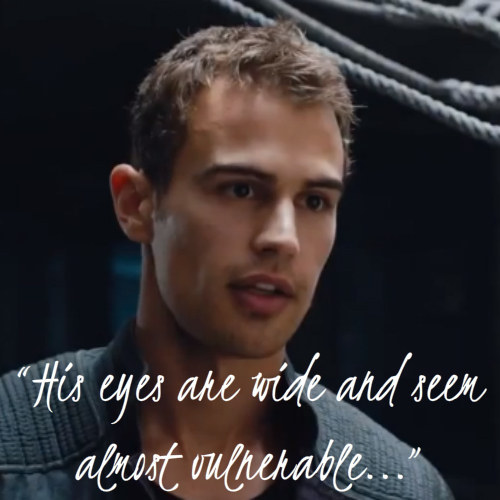Spoiler Alert: If you haven't yet read the first Divergent book or watched the movie, I recommend reading it at least to Chapter 25 before proceeding.
I thoroughly enjoyed the Divergent series and after I finished reading, I watched the first movie and was incredibly disappointed. Now, this is not an uncommon phenomenon and many people, including myself, tend to feel that books are usually better than movies. My problem, though, is not with the whole story, only Chapter 25. . If you watched Divergent without reading and you didn't understand what all the hype is about, this is why. Without this chapter, the intensity and importance of every other chapter suffers.
Chapter 25 is, in my opinion, not only the most important, but most captivating chapter in the series (followed closely by the epilogue of Allegiant). It is, hands down, one of the most intense, emotional exchanges between a blossoming couple I have ever read. It is the reason that "FourTris" feels real to me, while other fandom couples feel imagined. This is the chapter where Four brings Tris into his fear landscape.
Fear landscapes are quite an interesting and imaginative concept. Basically, you virtually experience your worst fears and must display the mental fortitude to calm your heartbeat during the event, causing it to end. Four's final two fears (killing an innocent women and standing up to his abusive father) are, admittedly, very similar in both the book and the movie, so I will skip those. I want to focus on the first two fears: heights, and claustrophobia.
In the movie version, the scene begins as Four leads Tris into the fear landscape room with the intent of helping her practice hiding her divergence (that's the title of the movie, after all). He nonchalantly expresses that he doesn't feel at all afraid of letting her into his head. His lack of fear makes him seem cold and perhaps a little unstable.
This is completely backwards from the book, where there is no mention of training or divergence at all. Yes, we all know Tris is divergent and we suspect Four is too, but, surprisingly, this chapter is largely unrelated. At this point in the novel, there is rising tension between the two. Four desperately wants to reveal himself mentally and emotionally to Tris but he is also nervous to do this. So, he sets himself up to be 'found' by her in the middle of the night. Both the reader and Tris are able to spot the clues and understand that he secretly wanted her to join him.
Tris asks: "You would let me see [your fear landscape]?"
Four reveals his purpose: "Why else do you think I'm going in? There are some things I want to show you."
Tris exposes her neck as he inserts the needle [and animal signal of trust and submission] and he shows her how to insert the second into his own neck. This is important! He could have done this himself, but he chose not to. Symbolically, I believe this officially destroys the teacher/student relationship the two once had.

As the scene changes, Four offers his hand to Tris, who notices that his fingers are cold and brittle. This clues us in to Fours mind. He is terrified, not just of the fears that lie ahead, but that he is about to reveal his most fragile, vulnerable self to another person, something he has never done before. He will also be revealing secrets about his past that could make him lose his position within the Dauntless community.
Back to the movie. In his clear-heading instructor role, Four inserts the needles for both himself and Tris and they are suddenly on a narrow bridge of pipes, high in the air. Despite this supposedly being one of his worst fears, Four seems unaffected and coaches Tris on how to beat the simulation while not giving away her divergent advantage.
This is also where we see that, in the movie, fear landscapes are beat by daring skill rather than by the mental acceptance and conquering of one's fears. In the book, for example, fear of heights is conquered by jumping, embracing the terror. In the movie, it is conquered by running heroically across the pipes. This is a significant difference. The theme of mental strength achieved by conquering one's own fears is something that repeatedly comes up for Tris, Four, and the everyone within Dauntless. It is the reason we can say the Dauntless are truly brave, they are actively striving to overcome their fears. In the movie, it is easy to assume they are merely reckless.
Let's take a look at a passage from the book.
"He removes his hand from mine, and wraps his arm around my shoulder instead. At first, I think it's to protect me. But no, he's having trouble breathing and he needs me to steady him. He forces breath in and out through an open mouth and his teeth are clenched."
Before this moment, she has only seen him as a calloused instructor. Now the teacher/student role is not only absent, it is reversed. Four is instantly blinded by fear and Tris becomes his protector, shouting encouraging directions and pulling him along while he can only nod and surrender to her orders.
The next fear to present itself is a small room with walls that are inching closer together. Let's start with the movie. Four simply continues to instruct Tris. She uses some loose nails to stop the mechanics of the moving walls while he makes a sarcastic remark and is mildly nervous at worst. The simulation seems over before it started.
Meanwhile, in the book, this is perhaps the most significant fear. Four's terror no longer stops at adorable teeth-chattering. He is gasping, grimacing, and making guttural noises in exchange for speaking. Tris realizes the importance of her role as his protector and guide. She understands that he has weaknesses and that he has chosen to show them to her, ugly as they may be.
Tris soothes Four: "Hey," I say, "it's okay. Here." I guide his arms around my body so he has more space.
She embraces him and he clutches at her. They are closer than they've ever been, both physically and emotionally. She continues to coach him, as she did during his fear of heights, concluding that they must, together, crouch down and make the walls close in at much as possible before the simulation will end. Four manages to squeeze out a "yes" in agreement.

Tris instructs Four to focus on her breathing. When she realizes that he doesn't want to talk, she volunteers, suggesting he ask her something. Four gives a shaky laugh and asks why her heart is racing. He seems to know that her feelings mirror his own and is comforted by this. His feeling of being comforted and his own nervous laughter trigger the simulation to end. The last two fear simulations, as I mentioned, happen similarly in both the book and the movie. Tris learns Four's real name and the origin of his nickname.
In the movie, this is where the scene ends.
In the book, Four is stuck staring at Tris in, what she sees as, awe.

He wraps her in his arms, kisses her cheek, and lays his face into her shoulder in relief and gratefulness.
Tris comforts Four: "We got through it."
Four feels incredibly close to Tris: "You got me though it."
From this point on, their relationship is forever changed. Tris sees four as vulnerable and able to relinquish control and trust in her. Four sees Tris as capable and dependable. They are now equals who see each other as well rounded humans. Like the ideal relationship, they complete each other, each having strengths and fears that the other does not. This is obvious to the reader but only becomes obvious to the characters when Four takes the brave risk to show take Tris into his fear landscape.
Wouldn't we all like to be so brave? I believe this Chapter rings true for so many readers, not only because it creates loveable and believable characters, but because speaks to the vulnerability and risk in every relationship. There are times and areas in which we must lead and others where we must submit and trust in another person. To be all one and never the other is inauthentic.
A fear landscape can be seen as a metaphor for one's innermost secrets and hidden attributes. Fear landscapes are heartless computer programs that put all of that emotional trauma right in front of you, with no regard for how it might embarrass or shame you. We all have secrets that we keep guarded my embarrassment or shame.
By letting Tris experience his fear landscape, Four was letting her completely into his mind, unfiltered and unguarded. It holds for significance than any kiss or flirtatious encounter ever could. To experience exchanging that kind of trust and vulnerability with another human is one of the most intimate acts we can achieve in our lives.
Yes, Divergent is a Young Adult novel, and yes, the characters have their clichéd moments. Even still, the series manages to touch on the intensity, the thrill, and the fear of love and human connection in a creative and relatable way. If you're a fan of bright characters and passionate, intense relationships, I highly recommend taking an incredible journey with Tris and Four. Or, if you're not a fan of YA literature, just remember the golden rule: Never judge a book by its movie.

